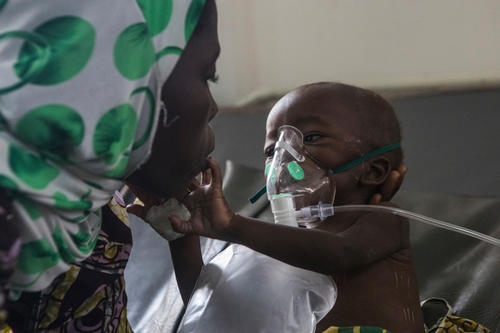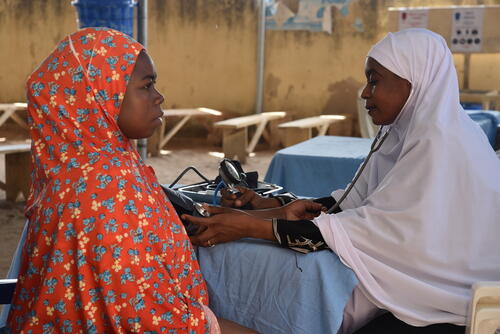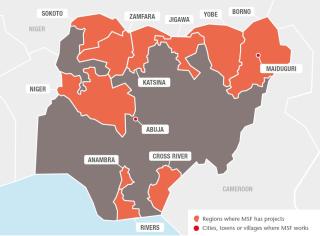
512,500
512,5
289,400
289,4
54,800
54,8

51,300
51,3
41,300
41,3
19,100
19,1

9,500
9,5
3,300
3,3
According to the United Nations, more than 1.7 million people are internally displaced in the northeast of Nigeria. Of these, some 80 per cent are in Borno state.<a href="https://reliefweb.int/sites/reliefweb.int/files/resources/22122017_ocha_nga_humanitarian_dashboard_jan_nov2017.pdf">United Nations Office for the Coordination of Humanitarian Affairs Nigeria humanitarian dashboard Jan.–Nov. 2017</a> and <a href="https://www.humanitarianresponse.info/sites/www.humanitarianresponse.info/files/documents/files/19042017_ocha_nga_borno_state_displacement_profile.pdf">Borno State Displacement Profile as of 19 April 2017</a> Thousands have been killed in the fighting and many more by the deadly combination of malnutrition, measles and malaria.
In 2017, MSF responded to Nigeria’s largest meningitis C outbreak in 10 years and continued to expand its programmes focusing on women and children. It is estimated that 58,000 women die from complications during pregnancy and childbirth every year and one in eight children dies before the age of five.<a href="http://www.who.int/reproductivehealth/publications/monitoring/maternal-mortality-2015/en/">World Health Organization Trends in Maternal Mortality: 1990 to 2015</a> and <a href="https://dhsprogram.com/pubs/pdf/fr293/fr293.pdf">2013 Nigeria Demographic and Health Survey</a>
Responding to armed conflict in the northeast
MSF has scaled up its assistance in Borno over the past two years, but access to areas held by armed opposition groups, or contested by the two sides, has been restricted, and little is known about the needs of people in these locations.
MSF teams in Borno and Yobe run paediatric nutrition programmes, vaccination campaigns, general consultations and services to support emergency rooms, maternity and paediatric wards and other inpatient departments. Staff also manage mental health activities, monitor food, water and shelter needs, and respond to disease outbreaks.
Although the nutrition situation has generally stabilised in Maiduguri, capital of Borno state, due to a massive deployment of aid, vulnerable pockets still remain. In some enclaves controlled by the military, people are unable to farm or fish due to restrictions on their movements, making them heavily dependent on humanitarian assistance. MSF teams distributed food and provided nutritional screening and care for over 35,700 malnourished children through the inpatient and outpatient therapeutic feeding centres in Borno and Yobe. A total of 11,842 children under five were admitted for care MSF facilities across the two states.
Primary and secondary healthcare for displaced people was available through fixed facilities in Maiduguri, Damboa, Benisheik, Gwoza, Monguno, Ngala, Pulka, Rann, Damaturu, Kukerita and Jakusko. Teams also deployed mobile clinics to the hard-to-reach towns of Bama, Banki, Damasak and Dikwa to improve water and sanitation as well as conduct medical consultations. Activities in Benisheik and Jakusko were handed over to other organisations at the end of the year. In Jakusko, MSF had treated more than 20,200 children under 15 for malaria.
MSF also handed over its mother and child healthcare programme in Maimusari and Bolori, in Maiduguri, to the Ministry of Health and closed Gwange intensive therapeutic feeding centre, but maintained the focus on child healthcare by opening a paediatric hospital with an intensive care unit at the same site.
In 2017, in the northeast of Nigeria, MSF conducted over 400,000 outpatient consultations. Over 9,000 deliveries were assisted by MSF teams, almost double the total number of assisted deliveries of the previous year. Teams also vaccinated children against measles, pneumococcal pneumonia and other preventable diseases.
The isolated town of Rann, where MSF runs a health facility, was bombed in January. At least 90 people, including three MSF workers, were killed and scores more were wounded. The Nigerian army later claimed responsibility for the bombing, saying it was a mistake.

Tackling outbreaks of disease
In response to a meningitis outbreak, MSF deployed teams to support the Ministry of Health in the worst-affected areas (Sokoto, Zamfara, Yobe and Katsina states), by providing medical supplies, training and assistance with case identification and management. In Sokoto, MSF ran a 200-bed facility. Teams assisted a vaccination campaign that reached more than 278,000 people in Sokoto and Yobe.
MSF continues to run epidemic surveillance and monitoring for epidemic-prone diseases such as meningitis, measles, cholera and Lassa fever. Between August and November, MSF responded to a cholera outbreak in Maiduguri, Monguno and Mafa, operating three cholera treatment centres and a cholera treatment unit. Over 4,000 patients were treated for cholera in Nigeria in 2017.
MSF also intervened to assist Cameroonian refugees in Cross River state, carrying out water and sanitation activities.
Providing healthcare for women and children
MSF runs the maternity and neonatal departments of Jahun general hospital, Jigawa state. A high proportion of the 1,000 women admitted per month in 2017 were suffering from obstetric complications such as eclampsia. In 2017, MSF treated 325 women for vesico-vaginal fistula, a condition resulting from prolonged obstructed labour that requires complex surgery. To reduce pregnancy complications, teams also support basic obstetrics in health centres.
In Sokoto, MSF continues to support the reconstructive surgery project in the noma children's hospital for patients with noma disease and other conditions. As well as surgery, the team provides pre- and post-operative care and mental health support. A total of 301 surgeries were performed on 243 noma patients in 2017.
In Rivers state, in partnership with the Ministry of Health, MSF opened a second clinic in Port Harcourt offering comprehensive care to victims of sexual violence. Outreach and community-based awareness activities were also organised in schools, police stations and through the media.
Responding to lead poisoning in Zamfara and Niger states
MSF began working in Zamfara state in 2010, responding to lead poisoning in children. In 2017, teams worked in five outreach clinics in Abare, Bagega, Dareta, Yargalma and Sumke, and in the paediatric inpatient department of Anka general hospital.
Following an outbreak of lead poisoning in Niger state in 2015 MSF’s safer mining project is working with miners to reduce their exposure to lead and off-site contamination. Similar safer mining pilots were initiated in Zamfara in 2017. Screening and case management of lead poisoned children are also part of the project, which treated 433 patients in 2017.
In Anambra state, MSF started a new project in Onitsha to tackle malaria through water and sanitation and vector-control activities, and provide support to local health facilities.


















